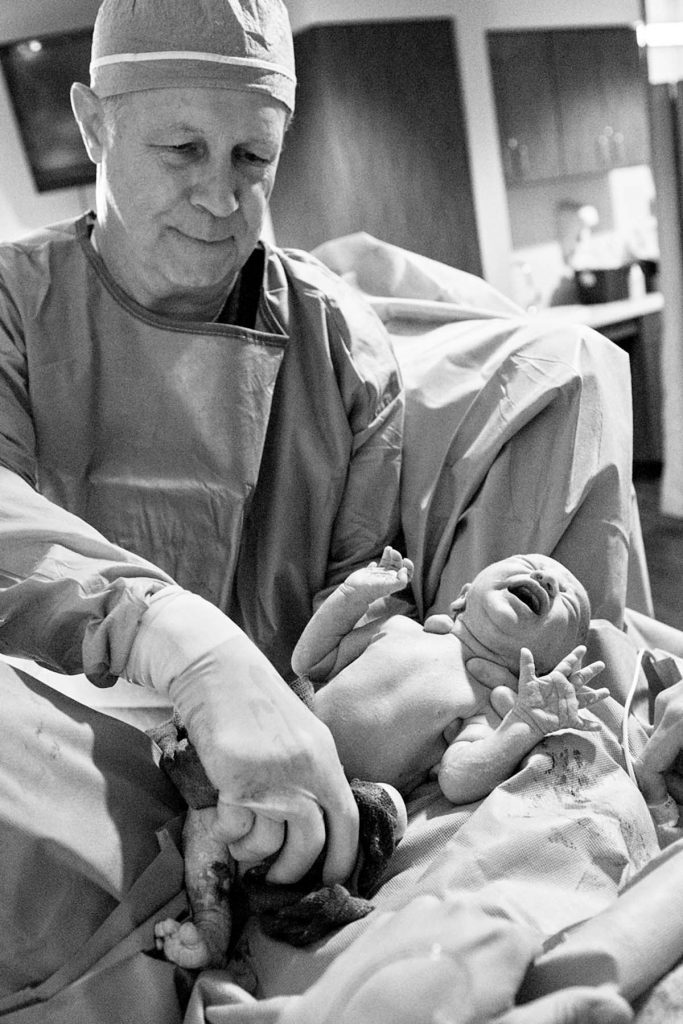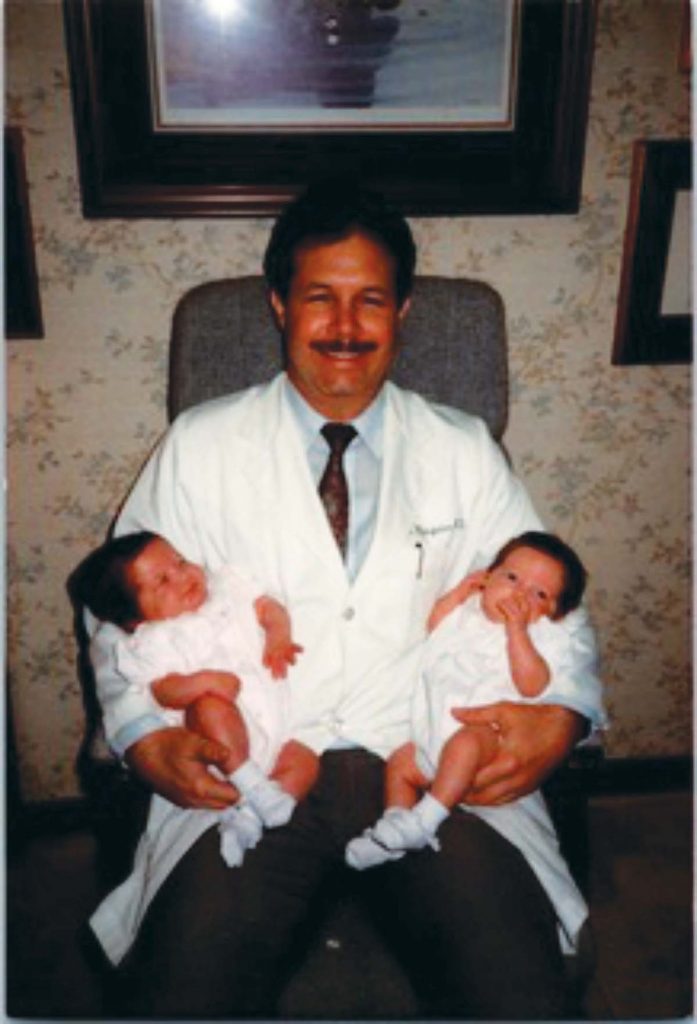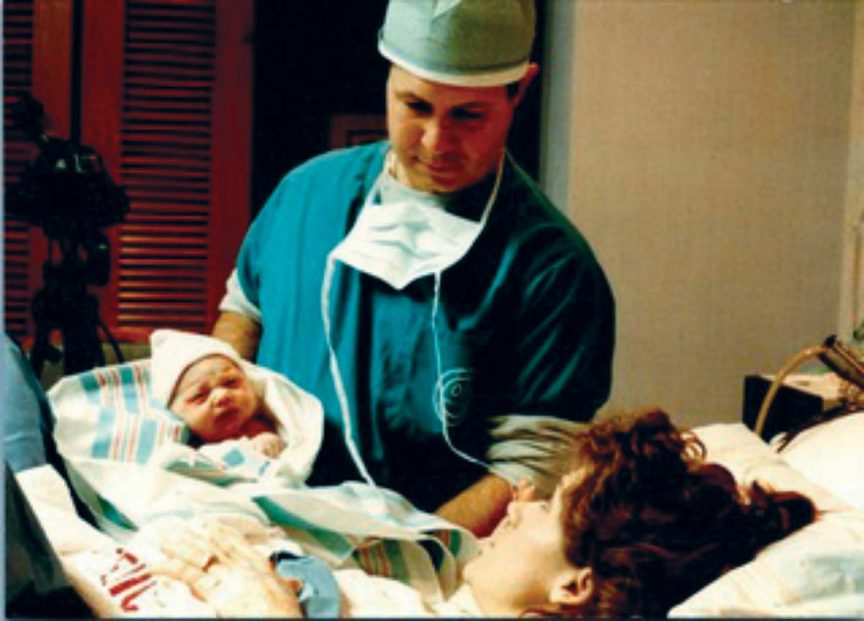Eleven years ago, I suffered a devastating loss.
Only 4 months into marriage, my husband and I became pregnant with our first child. Excited and surprised, we were ready to start our family. At about 12 weeks we sadly lost the baby and were diagnosed with a rare pregnancy called a Molar Pregnancy. At the time, this type of pregnancy was very “unusual” and not too many cases had been seen in our area. Scared and confused, I sought many opinions, which all ended with more questions.
To put it lightly, the consequences of this type of pregnancy could be severe if not taken care of immediately. As things started to get worse, I reached out to Dr. John Waterfallen in hopes that he could help. He was my angel that day and remains just that today. He knew exactly what was wrong and how to fix it. His expertise put me in the hands of the most wonderful physicians at both Christus Schumpert Cancer Center and Willis Knighton Cancer Center.
When I became pregnant after my treatment, Dr. Waterfallen cared for me like I was his own daughter. He would call just to check on me after hours and made sure he saw me once a week for the first 12 weeks of pregnancy. Dr. Waterfallen’s love for his career and his patients is remarkable. Today I am the proud Mommy to 2 of the most beautiful children, something that may not have happened without Dr. Waterfallen. After 40 years of practice, he is still just as eager and motivated to help people like me.
-Carie Hart
I grew up in Shreveport, Louisiana, and attended Centenary College, which had a renowned pre-med education program. My degree was in biology and I was especially enamored with genetics and embryology. In the 1970s, both of these studies were just gaining traction, so there was much momentum and excitement about being on the forefront in an emerging field. Genetics was exciting following the fairly recent discovery of double helix DNA. All of the new research was thrilling and I was fascinated with reproductive medicine.
I went on to attend LSU Medical School in Shreveport, which was then in its infancy. I remember applying to medical school and answering the question, “Why do you want to be a doctor?” My response was, “Because I want to help people and be able to use my expertise to make a difference in others’ lives.” Some medical schools look for students that will go on to work in research, but LSU was looking for doctors that would be involved in patients’ daily lives, which was exactly what I wanted to do with my life.

In medical school, my favorite subject was reproductive biology and thus obstetrics and gynecology. I continued my education in OBGYN residency at LSU Medical Center and became devoted to the specialty: The more I saw of OBGYN the more I loved it. There is a fact noted in the medical field that every physician either loves or hates the practice of OBGYN. I loved it and developed a true passion for women’s health. One certainly needs passion to be able to sustain the daily rigor of an OBGYN practice.
Looking back on my career, working in an emerging field has been incredibly exciting. Over the past 40 years, there has been a tremendous expansion in technology: In the 1970s, the practice of OBGYN progressed from being very similar to how it had been practiced for the previous 20 years to close to how it is practiced today. While I was in training, fetal monitoring and ultrasound were introduced, and wow, did that change things. We went from guessing about fetal growth and well-being to knowing about the fetus in great detail. This achievement in advanced diagnosis and treatment of the fetus provided precision in managing the pregnancy, which greatly enhanced neonatal outcomes.
With more advanced patient management, the birthing process became much more user friendly. This was evident with prepared childbirth, pain management options, and updated labor and delivery suites to contribute to patient comfort, satisfaction, and postpartum care.
Of course, the advent of epidural anesthesia greatly enhanced the birth experience as well. For the most part, epidural anesthesia has made labor “fun.” Of course, I must give a salute to the natural childbirth program, which is another concept for labor management that was being taught early in my practice in the 1980s. Natural childbirth is still a great option for those so inclined.
As the field has become more advanced overall, better facilities have been created and patients have better access to those facilities, which is very satisfying to see. In the early days of my career, there were a limited number of OBGYN doctors delivering babies. My partners and I delivered twenty plus babies each per month for 20 years. During the 1980s and 1990s, Schumpert Medical Center was a referral center for acute, high-risk pregnancy, so we managed many high-risk transports, primarily patients needing access to the neonatal nursery. We had patients coming to see us from an 80-100 mile radius because they needed access to more specialized care. Today, with the creation of more facilities equipped to care for high-risk situations, patients have more accessibility to premium care.
Other aspects of OBGYN practice have also exploded with technology: In vitro fertilization and minimally invasive surgery with the laparoscope and the robot were introduced. Outpatient surgery and short-stay hospitalization has enhanced the success and comfort of hysterectomy and other invasive gynecologic surgeries. Advancements in the specialty of anesthesia with better medications, techniques, and monitoring capabilities make outpatient surgery feasible.
Implementation of new technologies and advancements has been quite beneficial, but for me it has been most rewarding to be an integral part of the lives of patients and their families. Having delivered over 7,000 babies, it is difficult to put into words how meaningful my job has been for me, personally. OBGYN is demanding and sometimes exhausting, but also yields great professional satisfaction.
In answer to a common question – YES, it is still exciting to deliver each and every baby. Each new baby is a gift from God and there is always a spiritual context to the birth! So often, I witness the expression of “pure joy” with a birth, which is both exciting and rewarding. Guiding the patient through her pregnancy to a successful conclusion is deeply fulfilling to the doctor and staff.
Throughout my practice, I have cared for families, friend groups, and individuals from Shreveport and the surrounding area. When I first started my private practice in 1981, there were many more traditional families, so I have had the opportunity to take care of generations of women.
I have often cared for multiple generations – mother, baby, grandmother and great-grandmother. Being a part of many of these families’ lives is almost like playing on a team: You’ve been through thick and thin together and you have shared a bond, almost a spiritual bond. When they come to the office, it is like a reunion. We compare notes on what is happening in their lives; I love hearing all of the family updates.
And, all of the excitement isn’t just surrounding the obstetric part of the practice: it’s very rewarding to provide high-end solutions for all patients. Whether it’s for disabling periods requiring surgical intervention, for pain and discomfort that may require a hysterectomy, or for hormone therapy management. Many patients come in with disabling symptoms, and once we find a solution they say, “It’s the best thing I ever did and I should have done it sooner.”
While there are certainly many high points in the practice of OBGYN, there are also challenges. Two of the hardest parts are what you would expect: the balance of work/life and dealing with loss.
To be effective and successful in this specialty, the doctor must be available 24 hours per day for deliveries. That schedule of course puts a strain on personal time. It is an honor and a privilege to be with patients every step of their pregnancy all the way through delivery; however, being there for patients can mean time away from my family or missing out on activities you really want to do. The job is also physically taxing: seeing 30-40 patients every day, delivering babies weekly, performing weekly surgery, and being on a regular call schedule at all hours leads to a very busy life.
In general, reproductive medicine is mostly positive: helping women conceive, managing their pregnancies, and shepherding them through building a family. Sometimes nature doesn’t take the best course and bad things can happen.
When a patient loses a baby and the hope and excitement of a pregnancy, new baby, and new life are suddenly taken away from a couple, it causes great sadness to the patient and her family, but also to the doctor and staff. Every fetal loss is devastating. This type of loss requires a different aspect of care from the physician. Such is an opportunity to care for the patient on an emotional and spiritual level – giving them hope, understanding, and comfort. I have the opportunity to be there for the patient when she might not have anyone else to support her through the loss. Patients often find that there is very little emotional understanding and support when they have a miscarriage. The patient and husband often experience a feeling of profound loss, especially when they have faced infertility or repetitive miscarriage. I always do my best to reassure the patient with the facts: “Tomorrow is going to be a better day. You are going to grieve, but you always have hope to have a child.” And it’s always a momentous occasion when a patient is able to conceive and deliver a successful pregnancy after loss. Providing support through both joy and loss makes my practice very meaningful.
 When I reflect on favorite moments over the years, I am thankful for the opportunity to care for high-risk pregnancies, to facilitate infertility treatments, to coordinate private adoptions, and to support generations of women with care. It’s really all of the times I have given something away that are the most special to me: in the moment, those acts felt almost peripheral to my main practice, but now I look back and think, “that was my finest hour.”
When I reflect on favorite moments over the years, I am thankful for the opportunity to care for high-risk pregnancies, to facilitate infertility treatments, to coordinate private adoptions, and to support generations of women with care. It’s really all of the times I have given something away that are the most special to me: in the moment, those acts felt almost peripheral to my main practice, but now I look back and think, “that was my finest hour.”
For many years, I managed high-risk patients by referral and transport who required daily, detailed observation and treatment for a successful outcome. Dedication, consistency, and attention to detail would change a potential loss of the pregnancy or severe fetal complication into a successful delivery of a healthy baby. When this occurs, it is always such a triumph for everyone involved. Every time a baby is born, do you know how many connections have to occur? Trillions upon trillions of chemical reactions have to occur perfectly to produce a perfect baby. It never gets old seeing the miracle of life.
On more than one occasion, I have felt God’s grace so clearly when there was the perfect alignment for a private adoption within my practice. I would have a patient come in expressing her great desire to adopt a baby and soon after that encounter, I found another patient expressing her great need to surrender a baby. It’s simply amazing when the circumstances line up perfectly. When I make the call to the patient and ask, “If you still want to adopt a baby, there is one available.” The answer is always “1,000 times yes.” Every adoption I have been able to coordinate has felt like a divine appointment.
Welcoming a new baby into the world and seeing that baby also welcomed into a loving family is always very moving. I recently delivered a baby for a young lady whom I delivered. When interviewing she and her husband, I learned that I had delivered him, as well. Both of their mothers have continued to see me as patients so I know both families. The young mother was wheeled through the double doors from the delivery room holding her new baby and the doting crowd of family and friends was waiting to meet the newest member of the family. Everyone celebrated the new addition and it was such an inspiring picture of “continuity of care” and to realize how a new baby changes the lives of everyone involved.
Similarly, another one of my favorite moments probably didn’t seem that remarkable to anyone else. I remember taking care of a patient whose husband left the marriage while she was pregnant. When she went into labor, one of her close friends came to be her support person, and her friend happened to be a close patient of mine for whom I had delivered several babies. I remember the successful labor, in detail, and the baby was just gorgeous. As the friend and I looked at the new baby in the warmer together, we both started tearing up – overwhelmed by the beauty and joy in the moment. And we both commented that the new mother didn’t immediately grasp what had just happened to her: a life-changing miracle. Each having experienced the birth of our own children, the friend and I knew that this birth would bless her life forever.
Currently, I am doing fewer deliveries and enjoying it more! For years, all of the doctors in my practice and I were delivering 20 plus babies per month. I am actually closer to the national average now at eight to ten babies per month. This new pace definitely feels slower than what I had grown accustomed to, but my current schedule just means that now I have more time with my patients to help with anything I can. I give each patient my undivided attention. I carefully address all my patient’s issues. I put the patient in contact with other doctors if needed and we come up with cost-effective solutions to solve and treat their problems. I am still very involved with patient care and love every minute of it.
When I first started practicing medicine, my goal was to go into private practice, to stay in the same location, to treat families of patients for decades, to be very available, and to do the best for each patient regardless of circumstance. And I believe I have accomplished just that. Truly helping people is a great way to live. Would I do it all over again? Absolutely!

